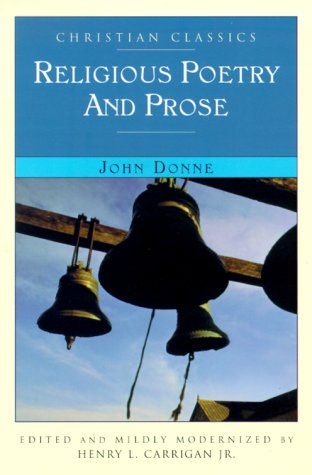Items related to Religious Poetry and Prose (Christian Classic)

"synopsis" may belong to another edition of this title.
Dr. Carrigan received a B.A. in English from Palm Beach Atlantic College in 1970, an M.Div. from Southeastern Baptist Theological Seminary in 1981, and a Ph.D. from Emory University in 1993. He has devoted the majority of his studies to English, Religion, Theology, Biblical Studies, and Religion in Literature.
Dr. Carrigan and his wife reside in Westerville, Ohio.
(From the Introduction) "Although the majority of Donne's religious writings come from the later period of his life, many of them contain an implicit concern for things religious. Even so ribald a lyric as "The Flea," Donne's meditation upon the marriage bed, is intertwined with his reflection upon the ways that the Trinity is reflected in a marital relationship. But his more mature reflections on religion do indeed belong to his later years.
Donne's religious writings express a clearly incarnational theology. The Incarnation, Atonement, and the Resurrection are the central themes of his sermons. His Christmas and Easter sermons are passionate and fiery paeans to the love of Christ. Even his Trinity sermons focus on the powerful and overwhelming love of Christ. This wonder and awe at the love of God incarnate in Christ also emerges from his Devotions and the Essays in Divinity.
Donne's religious poetry also communicates the power of Christ's love to weak sinners. Reflecting Donne's constant awareness of the sins of his early life, his poems often express his unworthiness to be forgiven by God in Christ. Revealing Donne's emphasis on Christ's earthly ministry, the first cycle of the Holy Sonnets traces Jesus' life and work from the Annunciation to the Ascension, and explored the ways that his life and work affect ours.
Donne's illnesses also loom large in his poetry and his prose. In the Devotions and in his prayers, physical illness often serves as a metaphor for spiritual illness. His great anxiety and despair about death are assuaged only by Christ's having delivered us from death by his own death, a point Donne makes with one repeated force in "Death's Duel." His fear of death, even though it may be found in such early poems as "A Valediction: forbidding Mourning," occupies much of his early religious poetry as, for example, in "Hymn to God my God, in my Sickness." Donne's greatest hope, even in illness and anticipation of death, is the mysterious love of God in Christ, who has delivered us from death and has gone to prepare a place for us in God's kingdom. Donne's religious writings are as full of thought and passion, irony and paradox, as his worldly writings." (Henry L. Carrigan Jr.)
"About this title" may belong to another edition of this title.
- PublisherParaclete Pr
- Publication date1999
- ISBN 10 1557252351
- ISBN 13 9781557252357
- BindingPaperback
- Edition number1
- Number of pages97
- EditorHenry L. Carrigan
- Rating
Buy New
Learn more about this copy
Shipping:
US$ 4.13
Within U.S.A.
Top Search Results from the AbeBooks Marketplace
RELIGIOUS POETRY AND PROSE (CHRI
Book Description Condition: New. New. In shrink wrap. Looks like an interesting title! 0.31. Seller Inventory # Q-1557252351

